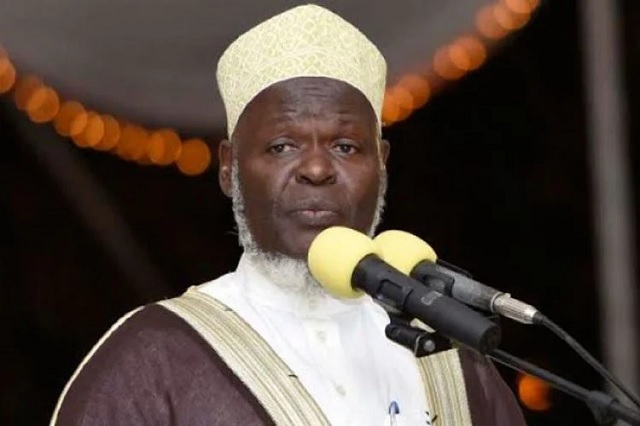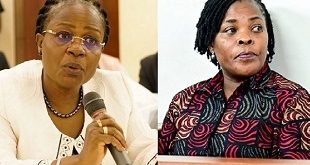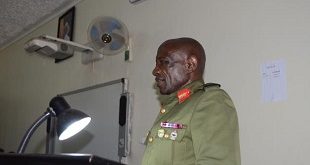
Kampala, Uganda | THE INDEPENDENT | A court order granting authority to Babirye Yudaya, Burhan Namanya, and Hussein Simbwa to organize a special session of the Uganda Muslim Supreme Council ( UMSC) General Assembly, has resulted in the group saying they have electing a new Mufti, Sheikh Abdallah Ssemambo, supposedly to replace Shiekh Shaban Ramadhan Mubaje.
Hadji Abbas Sekyanzi Muluubya, the UMSC General Secretary, has however dismissed the election, arguing that Article Five of the council’s constitution states the removal of the Mufti from office can only occur through a joint session of the Executive Committee and the Majlis Al-Ulama or the College of Sheikhs.
Hajj Muluubya added that UMSC is operating normally and officially recognizes only one Mufti, who is none other than Mubaje.
The lastest confusion started at the weekend, when a section of members of the UMSC General Assembly, which is officially the top organ of the Muslim body, conducted what they said was a special session, resulting in the suspension of both the Mufti, Sheikh Mubaje, and the organization’s National Chairperson, Dr. Mohammed Lubega.
Their action followed a court order that granted a special session of the Uganda Muslim Supreme Council General Assembly.
On December 12, a court order issued by Justice Faridah Shamilah Bukirwa Ntambi of Jinja High Court allowed the meeting to discuss the overall state of the Uganda Muslim Supreme Council. The order also imposed an immediate obligation to submit a report on the proceedings to the court.
“…let a special sitting of the General Assembly of the UMSC be immediately called to look into the affairs of the UMSC generally and immediately file a report before this Court: the said General Assembly should sit at any time and from time to time as the circumstances permit,” the court order reads in part.
Normally, such gatherings are initiated by the Secretary-General of UMSC and are held at the organization’s headquarters. However, the court order, seen by URN, permitted any person designated by the petitioners, to convene the meeting.
“The said special General Assembly siting and/or sittings of the UMSC as directed by this Court shall be called by a person appointed by the Petitioners and the special General Assembly shall sit at a neutral venue,” the order reads.
The court order specified that a neutral person, elected by the members during the initial session, would preside over the proceedings.
Sheikh Ssemambo, the Deputy Mufti of Uganda, was subsequently elected to assume the role of Acting Mufti of Uganda.
The meeting further launched an inquiry into the alleged sale and auctioning of Muslim mosques, including the National Mosque and as part of this investigation, Mufti Mubajje was suspended for six months to facilitate the commencement and conduct of the inquiry.
A committee was established to carry out the said investigation, and it included Hajji Mudathi Dooka from West Nile, Musa Muyinda from Makindye, Zulaika Kamara, the Women Representative, Isa Gule from the Eastern region, Yasin Kakuru from Kigezi and Muzamul Nsimbi from Busoga.
The special sitting also went on to appoint Isa Gule as the new chairperson for the UMSC, leading to the suspension of Dr. Mohammed Lubega from his responsibilities. However, some members of the meeting observed irregularities in the election of Lubega.
Hadji Muluubya, the UMSC General Secretary, soon after characterized the events of the sitting at Gangu Islamic schools as superficial. He argues that the proceedings during the special session of the general assembly deviated from the proper procedures stipulated in the UMSC Constitution.
He said that according to Article Five of the council’s constitution, the removal of the Mufti from office can only occur through a joint session formed by the combined meeting of the Executive Committee and the Majlis Al-Ulama or the College of Sheikhs.
The constitution outlines six reasons that may lead to the removal of the Mufti, which includes if he becomes mentally unfit, is declared bankrupt under Ugandan laws, conducts himself in a manner unsuitable for his office, is convicted of a criminal offense, violates Islamic norms and national laws, tarnishing his public image according to the Majlis Al-Ulama’s opinion, or becomes incapable of performing his duties.
Article 11 of the same constitution outlines the impeachment process and offers an alternative avenue. It says for an impeachment to be initiated, a written petition in triplicate is required. It further says that the petition must bear the signatures of at least one-third of the members comprising the joint session.
Hajj Muluubya added that UMSC is operating normally and officially recognizes only one Mufti.
Prior to the weekend special meeting, an order was issued to the UMSC leadership, but it was rejected by the UMSC Advisory Council during its inaugural meeting on December 13. This council is composed of retired Muslim leaders, Muslim opinion leaders, experienced and seasoned Muslim leaders, eminent Sheikhs, and the current Mufti of Uganda, not exceeding twenty-one members.
Chaired by Obed Kamulegeya, the former Chief Khadi of Uganda, the council emphasized that before resorting to civil courts, Muslims should first exhaust internal mechanisms.
Hadji Muluubya asserts that the order was erroneously issued because the judge overlooked Article 17 of the UMSC, which outlines the provision for holding extraordinary sessions. He adds that the council has initiated processes to challenge the order and the activities stemming from it.
Article 17 of the UMSC says that the Secretary-General is responsible for convening an Extraordinary General Meeting of the Assembly upon receiving a memorandum signed by one-third of the members of the General Assembly, requisitioning such meetings. The article further stipulates that the meeting is to be convened with a seven-day notice, which is to be sent and published in electronic and print media.
Acting Mufti or Deputy Mufti in Trouble?
Having been sworn in as the Acting Mufti, the first Deputy Mufti Ssembabo appears to be facing potential trouble, as the UMSC is contemplating launching an inquiry into his conduct with sources indicating that meetings to “discipline” him have already started sitting.
“By appearing there, he himself knew what would follow. The (Mubaje-led) UMSC cannot sit and do nothing,” remarked a source from Old Kampala.
Indeed, Muluubya noted that during the swearing-in, the Deputy Mufti pledged to uphold the UMSC constitution.
According to Abbas, any failure by the Deputy Mufti to adhere to this oath would constitute a violation of the constitution. Abbas further notes that there is a prescribed process for addressing instances of non-compliance.
In a telephone interview, Ssemambo emphasized that he was duly elected as the Acting Mufti during the investigation into his boss. However, he declined to comment further saying he was heading into a meeting.
“What do you expect people from Old Kampala to say? For more information on this matter, please call this number,” Ssemambo told our reporter before avoiding contact numbers for further inquiries.
However, despite reaching out to the provided number, there was no response. Efforts were also made to contact other individuals who participated in the special session over the weekend, with the majority noting that they were currently in a meeting.
A lay Muslim, who wished to remain anonymous, has conveyed the belief that the two conflicting factions are not motivated by religious differences or a concern for what is beneficial for Muslims. Instead, they seem to be embroiled in a power struggle for control over the leadership of UMSC.
“The Mubaje faction engaged in wrongful actions by selling Muslim property and endorsing inappropriate documents. However, even those opposing these actions had a hand in similar activities. Currently, both groups are putting on a show for the public, but the truth is that these are power games determining who controls UMSC,” the lay Muslim stated.
While it appears that the current controversy was sparked by the allegation that the Mufti and others sold Muslim property, there are events on record indicating its dates back from the time UMSC constitution was reviewed, throughout the election period, and in the General Assembly in December last year.
During the December 2022 general assembly, it became evident that the conflict was between the Hussein Bassajabala faction, led by Hajj Abdul Kyimba, the representative from Lwengo, and the Mubaje faction on the other side.
Bassajabala, who has a long history of rivalry with the incumbent Mufti, sought to reclaim the position of Chairperson of the General Assembly. However, his candidacy was contested because he had been impeached previously, rendering him unfit to contest under the provisions of the UMSC Constitution.
*******
URN
 The Independent Uganda: You get the Truth we Pay the Price
The Independent Uganda: You get the Truth we Pay the Price


